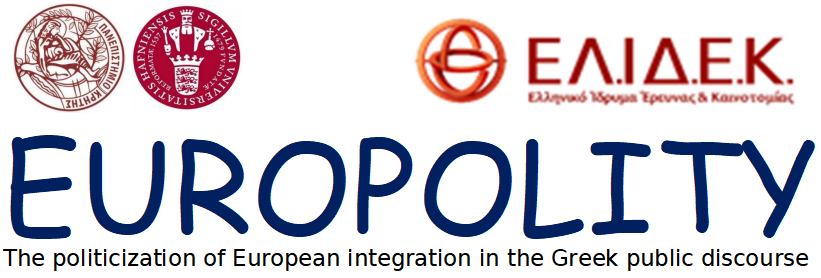The proposed research draws on the ‘democratic functionalism’ approach that sees an expanding public discourse, carried out by an independent self-steering media that makes executive decisions transparent, as a necessary requirement for democracy (Statham & Trenz 2015). The overarching research question of the project is: What political claims are made and by whom in the Greek public sphere regarding the European integration process? However, the project does not limit itself to description but aims at explaining the patterns of political claims making in general and the attribution of responsibility in particular. Accordingly, the second set of research questions are: How and to what extent does public claim-making change over the 1975-2017 period? How can we explain the different political claim making by different actors? Our explanations refer to the structural position of the actors, the strategic interaction among them and the political dynamic both in Greece and in Europe.
A detailed knowledge of claims making permits a deeper understanding of which integration policies, were supported by whom with relation to which arguments, that could gain acceptance by which reference group? How political and civil society actors responded to a specific opportunity structures for mobilizing over European integration through the period under study? Which patterns of support and opposition appear in public and media discourse and how they change over time? How much Europeanized the Greek public sphere has become? These findings relate to the ongoing debates on EU politicization, on the Europeanization of the public sphere and on the Europeanization of contention regarding especially the recent economic and refugee crises, the rise of negative critiques on the EU project, and the possible secession of member states.
The pattern of claims making, we want to explain, covers four dimensions: position, direction, intensity, and polarization. Position is the stance an actor takes towards an issue. The direction refers to the chosen addressee. Intensity consists of two aspects: first how much, long, and often a specific issue is discussed, and second the number of different actors involved in the debate as they appear in the press. Finally, polarization refers to the intensity of conflict over an issue among the various actors and the existence of strong opposing camps. The attribution of responsibility as a specific kind of political claim deserves particular attention since it is very helpful in the kind of explanation we wish to provide. The unit of this sub-analysis is an attribution, in which a sender attributes the responsibility of an evaluated object to an addressee.
Our primary objective in the proposed research is to provide a systematic and detailed picture of the public debate on European integration in Greece, and actors’ positions within this debate. Therefore, the project: a) combines the quantitate research method of political claim analysis in its special form of discursive attribution of responsibility analysis on media data with the qualitative research method of conducting semi-structured interviews with important actors in the public debate, b) complements the discursive approach with content analysis of selected parliamentary minutes over the 1975-2020 period, c) offers a policy analysis report of key EU related issues for Greece in order to enrich our understanding of the positioning of actors in the debate, the structure of available each time political opportunities and threats, and of the broader political and economic context.
